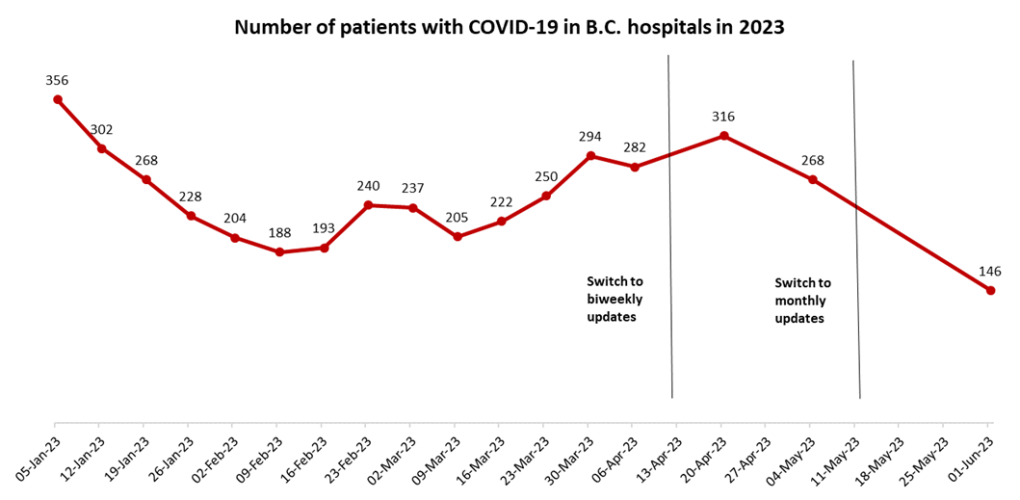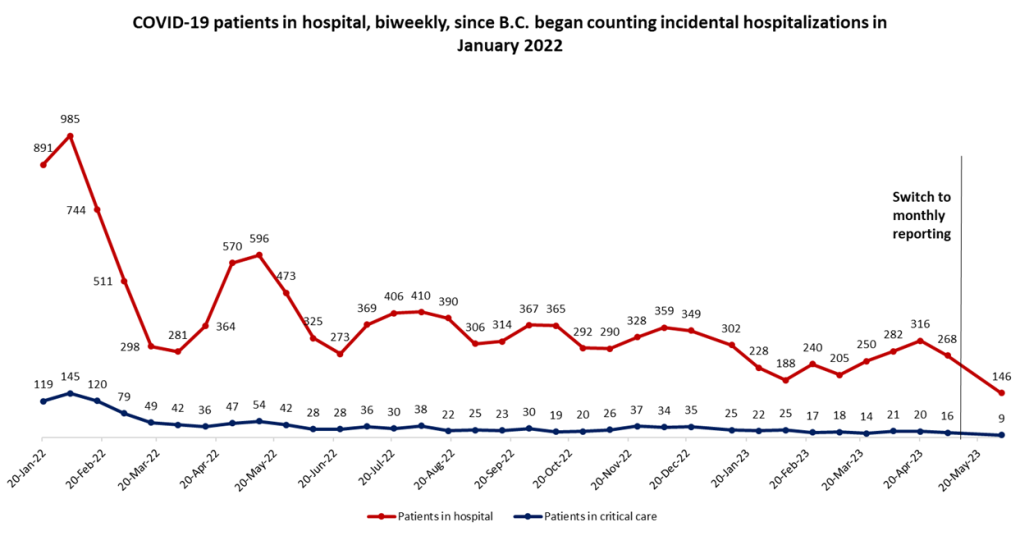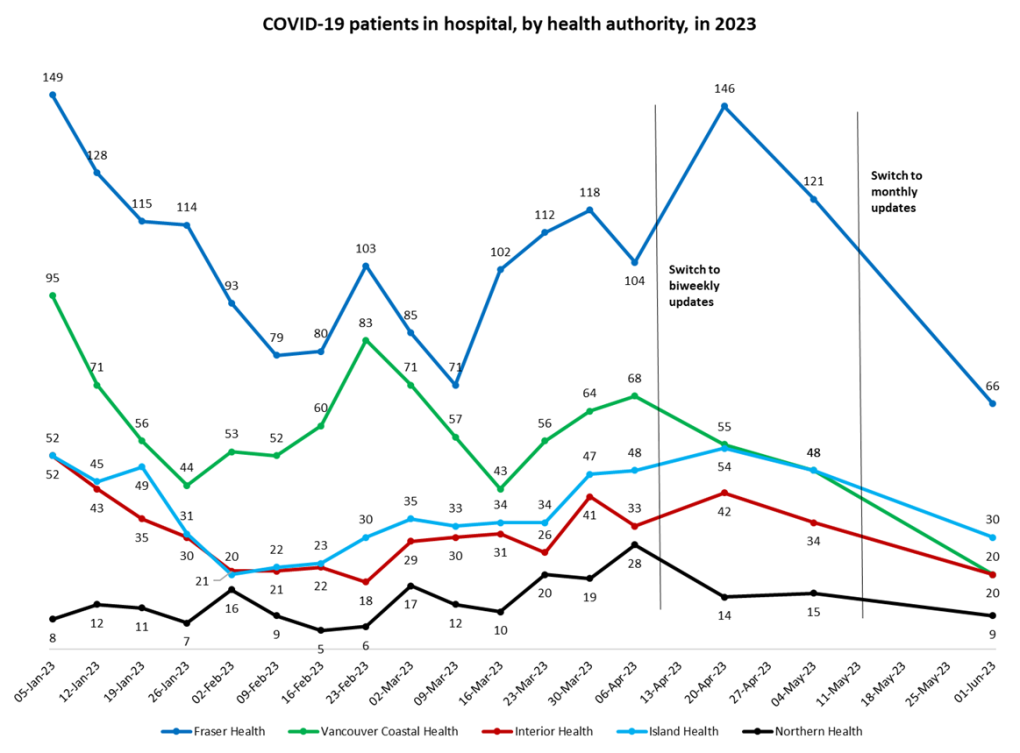B.C. COVID-19 hospitalizations hit their lowest level in almost 2 years this month
 The exterior of the B.C. Centre for Disease Control office in Vancouver is seen in this photo from the centre's website. (bccdc.ca)
The exterior of the B.C. Centre for Disease Control office in Vancouver is seen in this photo from the centre's website. (bccdc.ca)
Weekly wastewater surveillance data from the B.C. Centre for Disease Control suggests COVID-19 transmission has continued declining in the Lower Mainland this month, a week after the centre reported its lowest hospitalization total in nearly two years.
Wastewater data published this week shows decreasing concentrations of the SARS-CoV-2 virus in all five Metro Vancouver treatment plants.
As of June 4, concentrations at Lions Gate treatment plant on the North Shore had declined by 42 per cent compared to the previous week. Northwest Langley saw a decrease of 33 per cent, Annacis Island decreased by 29 per cent, Iona Island saw a 22-per-cent decrease and Lulu Island a 10-per-cent decrease.
Data for treatment plants outside the Lower Mainland had not been updated to include June 4 data as of Friday. Instead, they showed data from May 28, when all tracked regions except Kamloops and Nanaimo saw a decrease.
MONTHLY DATA
Wastewater has been the exception to the BCCDC's transition to monthly reporting of COVID-19 numbers.
Data on wastewater continues to be updated weekly on the centre's website, providing some insight as to the direction disease transmission may be heading between monthly updates.
This month's update, released June 1, showed a significant decline in the number of people in hospital with COVID-19 in B.C., which CTV News has been tracking closely since the start of the pandemic.
There were 146 test-positive COVID-19 patients in B.C. hospitals as of June 1, the lowest total seen all year.
 The number of people in hospital with COVID-19 in B.C. in 2023, as reported by the BCCDC, is shown. (CTV)
The number of people in hospital with COVID-19 in B.C. in 2023, as reported by the BCCDC, is shown. (CTV)
Indeed, the last time the BCCDC reported a hospitalized population lower than 146 was almost two years ago, in August 2021.
At that time, the province used a different method of counting hospitalizations that sought to account for whether COVID was the underlying reason a patient was in hospital. Patients who tested positive for the disease incidentally, while in hospital for other reasons, were not included in the count.
Since the BCCDC began including incidental hospitalizations in its total, 146 is the lowest number it has reported in any update.
 The number of patients in hospital with COVID-19, as reported by the BCCDC, since the province switched to including incidental hospitalizations in its count in January 2022. (CTV)
The number of patients in hospital with COVID-19, as reported by the BCCDC, since the province switched to including incidental hospitalizations in its count in January 2022. (CTV)
Underlying the June numbers were drops in hospitalizations across all of B.C.'s regional health authorities, perhaps most notably in Vancouver Coastal Health, where just 20 people were in hospital as of June 1.
There were fewer people in VCH hospitals than there were in hospitals in the Island Health region, despite the fact that Island Health has roughly 400,000 fewer residents. The VCH total was tied with that of Interior Health, which also has a significantly smaller population.
 The number of COVID-19 patients in hospital by health authority in 2023 is shown. (CTV)
The number of COVID-19 patients in hospital by health authority in 2023 is shown. (CTV)
CTV News asked VCH if it had any explanation for why fewer people are ending up in hospital with COVID-19 in the region. The answer was no.
"COVID continues to circulate and will cause different impacts in different places as it has at all times during the pandemic, however, thanks to high rates of vaccination and less virus circulating, the number of cases continues to decline overall," a spokesperson said via email.
CTVNews.ca Top Stories

BREAKING Honda to get up to $5B in govt help for EV battery, assembly plants
Honda is set to build an electric vehicle battery plant next to its Alliston, Ont., assembly plant, which it is retooling to produce fully electric vehicles, all part of a $15-billion project that is expected to include up to $5 billion in public money.
BREAKING New York appeals court overturns Harvey Weinstein's 2020 rape conviction from landmark #MeToo trial
New York’s highest court on Thursday overturned Harvey Weinstein’s 2020 rape conviction, finding the judge at the landmark #MeToo trial prejudiced the ex-movie mogul with improper rulings, including a decision to let women testify about allegations that weren’t part of the case.
1 arrested in northern Alberta during public shelter order
Residents of John D'Or Prairie, a community on the Little Red River Cree Nation in northern Alberta, were told to take shelter Thursday morning during a police operation.
Secret $70M Lotto Max winners break their silence
During a special winner celebration near their hometown, Doug and Enid shared the story of how they discovered they were holding a Lotto Max ticket worth $70 million and how they kept this huge secret for so long.
Remains from a mother-daughter cold case were found nearly 24 years later, after a deathbed confession from the suspect
A West Virginia father is getting some sense of closure after authorities found the remains of his young daughter and her mother following a deathbed confession from the man believed to have fatally shot them nearly two decades ago.
Monthly earnings rise, payroll employment falls: jobs report
The number of vacant jobs in Canada increased in February, while monthly payroll employment decreased in food services, manufacturing, and retail trade, among other sectors.
First in Canada procedure performed at London, Ont. hospital
A London man has become the first person in Canada to receive a robotic assisted surgery on his spine. Dave Myeh suffered from debilitating, chronic back pain that led to sciatica in his right now and extreme pain in his lower back.
Doctors say capital gains tax changes will jeopardize their retirement. Is that true?
The Canadian Medical Association asserts the Liberals' proposed changes to capital gains taxation will put doctors' retirement savings in jeopardy, but some financial experts insist incorporated professionals are not as doomed as they say they are.
Something in the water? Canadian family latest to spot elusive 'Loch Ness Monster'
For centuries, people have wondered what, if anything, might be lurking beneath the surface of Loch Ness in Scotland. When Canadian couple Parry Malm and Shannon Wiseman visited the Scottish highlands earlier this month with their two children, they didn’t expect to become part of the mystery.































